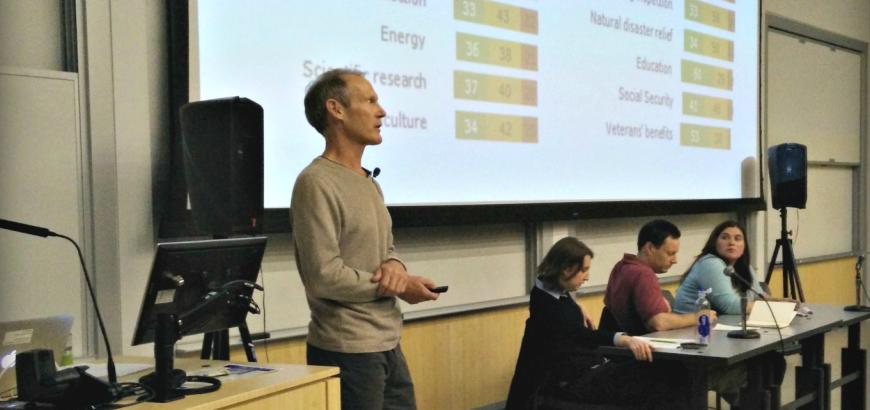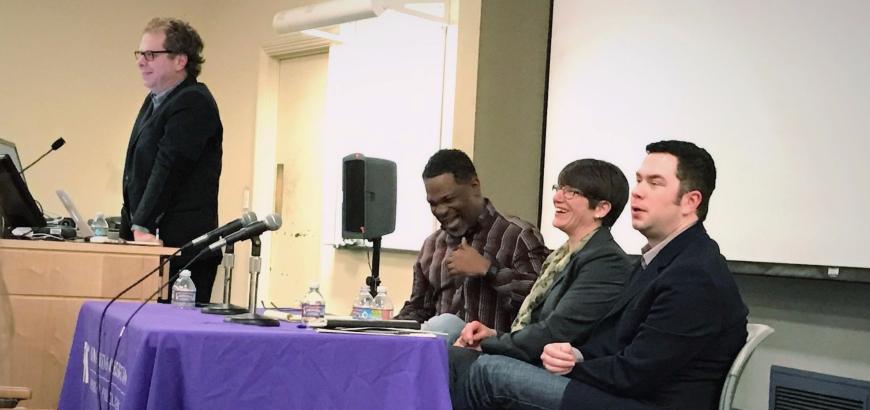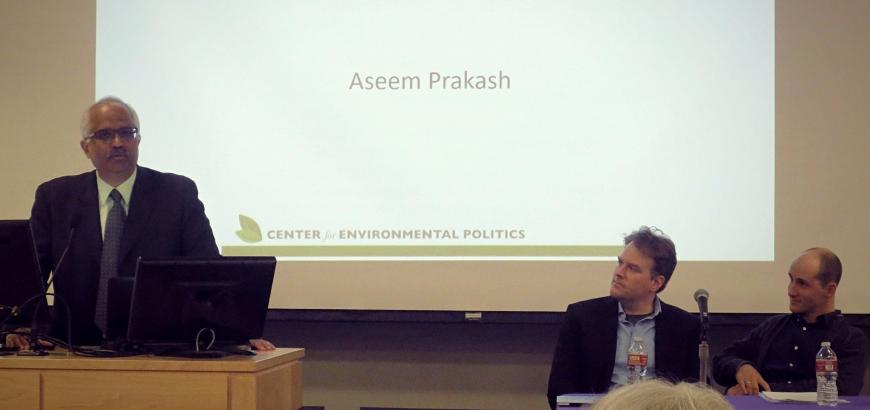Why did Donald Trump win the presidency if Hillary Clinton had nearly three million more votes? What policy changes can President Trump make through executive orders without cooperation from Congress? How will people in China respond to the Trump presidency? Did Trump’s victory dramatically reduce the chances of addressing climate change through international agreements? These and many other questions related to the 2016 presidential election were discussed by UW faculty in a series of three public forums held this year by the Department of Political Science.
The department began hosting regular faculty panels on current political issues a few years ago. The panels were initially designed for students, but this year we invited alumni and friends of the department as well. The US election provided compelling topics for this year’s panels, and the department was delighted that many people from our broader community attended and asked challenging questions. More panels are being planned for next year, so please contact us (polisci@uw.edu) if you would like to be added to the list for announcements.
The first panel convened two weeks after the election and focused on Trump’s surprise victory and its impact on US politics and policy. Professor Mark Smith explained the importance of the Electoral College, noting that Hillary Clinton’s large popular vote advantage reflected her outsized margin of victory in a few very large states. Smith said many of the Clinton votes in such states were “wasted votes” because additional support beyond a bare majority of a state does not produce additional electoral votes. Ultimately, Smith argued, Trump won because his voters were perfectly distributed in a few key states that Trump led by very narrow margins. Professor Sophia Jordán Wallace next discussed the role of race in the 2016 election. She noted the sharp racial polarization, with Trump winning a majority of white voters and Clinton winning 80 percent of all minorities. Furthermore, Wallace explained that some states made it more difficult for racial minorities to vote following the Supreme Court decision Shelby County v. Holder.
The discussion then shifted to the likely impact of the election on public policy in the days ahead. Professor Rebecca Thorpe noted that Trump has considerable power to reverse Obama-era policies through executive orders, but also that changes in some policy areas would require action from Congress. Professor John Wilkerson reminded the audience of the importance of Republican victories in congressional elections, observing that a unified Republican government has been in place for only six of the past 60 years.
A second faculty forum in March focused on the impact of the American election on politics in other parts of the world. Our resident China expert, Professor Susan Whiting, pointed out that Trump’s attacks on Muslim immigration could resonate with the Chinese public’s growing fear of terrorist attacks. Some of Trump’s promises matched earlier developments in China. China has implemented an “iron fist” policy targeting separatists in Xinjiang, the region with the highest concentration of Muslims. Whiting also noted that in 2000, the Chinese communist party began to promote the “great revival of the Chinese nation” with a call to “make China great again.” Professor James Long then discussed US foreign policy in Africa and the Middle East, pointing out the uncertainty about such policies given Trump’s contradictory statements during the campaign. Professor Christopher Parker looked at links between the Tea Party and the rising far right movements outside the United States. Parker said the rise of such movements cannot be explained by economic factors. The popularity of right-nationalist parties reflects fears about immigration and rapid cultural change.
In May, the year’s final faculty panel focused on how the United States will approach global policy in the years ahead. Professor Aseem Prakash argued that the short-term obsessions with Trump hide important longer-term patterns. Prakash noted that the global challenge of protecting the environment pre-dated Trump’s election. However, he added optimistically that both the Republican and the Democratic parties have had past periods of strong support for environmental protection. Prakash suggested that better messaging around the economic benefits of green energy for the US might lead to different political outcomes. Professor Geoffrey Wallace considered the possibility of dramatic reversals in US foreign policy, arguing that some policies would be more difficult to reverse because “process matters.” Established protocols that ensure the involvement of a broader range of actors can limit what any President can change single-handedly. Finally, Professor Christopher Adolph looked at the politics of international trade agreements, demonstrating that the economic losses from existing trade agreements have been concentrated in a few states that turned out to be pivotal in the election. Examining broader national economic trends, Adolph argued that the problem was not a decline in US manufacturing but declines in manufacturing jobs and declines in wages relative to worker productivity. Adolph reflected on personal experience visiting Youngstown, Ohio, explaining that the region has a history of electing local candidates who promise to restore manufacturing jobs. However, he also noted that such promises are never met, and that a better political solution would be policies to improve pay in remaining jobs and create new economic opportunities in the region.
The surprising outcome of the historic 2016 election created a great deal of interest and often concern among UW students as well as many people in our region. The department faculty forums aim to help people to understand these important developments. We hope to host another successful series next year, and are looking forward to participation from students, alumni, and friends of the department.


